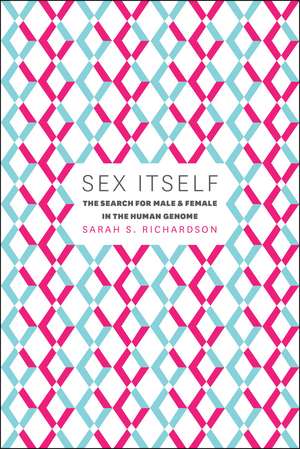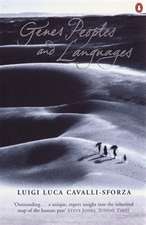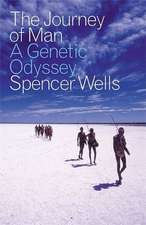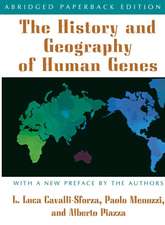Sex Itself: The Search for Male and Female in the Human Genome
Autor Sarah S. Richardsonen Limba Engleză Paperback – 8 oct 2015
Human genomes are 99.9 percent identical—with one prominent exception. Instead of a matching pair of X chromosomes, men carry a single X, coupled with a tiny chromosome called the Y. Tracking the emergence of a new and distinctive way of thinking about sex represented by the unalterable, simple, and visually compelling binary of the X and Y chromosomes, Sex Itself examines the interaction between cultural gender norms and genetic theories of sex from the beginning of the twentieth century to the present, postgenomic age.
Using methods from history, philosophy, and gender studies of science, Sarah S. Richardson uncovers how gender has helped to shape the research practices, questions asked, theories and models, and descriptive language used in sex chromosome research. From the earliest theories of chromosomal sex determination, to the mid-century hypothesis of the aggressive XYY supermale, to the debate about Y chromosome degeneration, to the recent claim that male and female genomes are more different than those of humans and chimpanzees, Richardson shows how cultural gender conceptions influence the genetic science of sex.
Richardson shows how sexual science of the past continues to resonate, in ways both subtle and explicit, in contemporary research on the genetics of sex and gender. With the completion of the Human Genome Project, genes and chromosomes are moving to the center of the biology of sex. Sex Itself offers a compelling argument for the importance of ongoing critical dialogue on how cultural conceptions of gender operate within the science of sex.
Preț: 185.85 lei
Nou
Puncte Express: 279
Preț estimativ în valută:
35.56€ • 37.33$ • 29.52£
35.56€ • 37.33$ • 29.52£
Carte disponibilă
Livrare economică 20 martie-03 aprilie
Livrare express 06-12 martie pentru 28.13 lei
Preluare comenzi: 021 569.72.76
Specificații
ISBN-13: 9780226325613
ISBN-10: 022632561X
Pagini: 320
Ilustrații: 16 halftones, 10 line drawings
Dimensiuni: 152 x 229 x 25 mm
Greutate: 0.47 kg
Editura: University of Chicago Press
Colecția University of Chicago Press
ISBN-10: 022632561X
Pagini: 320
Ilustrații: 16 halftones, 10 line drawings
Dimensiuni: 152 x 229 x 25 mm
Greutate: 0.47 kg
Editura: University of Chicago Press
Colecția University of Chicago Press
Notă biografică
Sarah S. Richardson is assistant professor of the history of science and of studies of women, gender, and sexuality at Harvard University. She is coeditor of Revisiting Race in a Genomic Age. She lives in Chester, CT.
Cuprins
1. Sex Itself
2. The Odd Chromosomes
3. How the X and Y Became the Sex Chromosomes
4. A New Molecular Science of Sex
5. A Chromosome for Maleness
6. Sexing the X
7. The Search for the Sex-Determining Gene
8. Save the Males!
9. Are Men and Women as Different as Humans and Chimpanzees?
10.Gender and the Human Genome
Acknowledgments
Notes
Bibliography
Recenzii
“Erudite and well-balanced. . . . Richardson takes issue with the perpetual reductionist view on sex differences. Perplexed by the suggestion made in 2005 that genetic differences between men and women are larger than those between humans and chimpanzees, she meticulously demonstrates how the genetics of sex has been modeled on alleged and often rehearsed gender distinctions between men and women. But she does more. Richardson skillfully demonstrates how instrumental sex differences have been in the development of genetics. . . . Not simply an account of the effect of gender on genetics, [Sex Itself] provides us with tools to think of the possibility of a gender-critical genetics.”
“Sex Itself is a provocative book that sits at the intersection of history, philosophy, and social studies of science and gender, and is well worth picking up.”
"Accessible, beautifully written, and compelling (plus, the illustrations are excellent). I could hardly put the book down. . . . Sex Itself is not only valuable as a model of feminist empiricist work, but it is also courageous. Richardson takes the science seriously and follows its implications, even if it conflicts with trends in feminist theory; she takes feminist work seriously and applies its methods to critique scientific research. . . . An important contribution to feminist scholarship."
"Sex Itself offers an insightful analysis of how 'sex' and 'gender' as social odering concepts are woven into genetic research. . . . At the same time, [Richardson] offers something more than a straightforward account of how science is sexed and gendered. At its core, Sex Itself is concerned with ethics as much as history."
“This book convincingly documents the social and cultural values molding changeable gender views and warns that prevailing norms influence the path of scientific research. Recommended.”
"In Sex Itself, Richardson takes gender criticism to a new level — the genomic one.
Richardson compellingly argues that gender is central to our understandings of chromosomal sex, and advocates for the acknowledgement of the interplay between sex and gender so that we may recognize how gender acts not only as a source of bias, but as a productive force driving genetic research. Her impressively clear writing, and the clever illustrations judiciously sprinkled throughout the text, help her less scientifically inclined readers quickly develop requisite familiarity with core biological and genetic concepts. This is an excellent addition to the feminist science studies literature, which should enjoy a wide readership across disciplines."
Richardson compellingly argues that gender is central to our understandings of chromosomal sex, and advocates for the acknowledgement of the interplay between sex and gender so that we may recognize how gender acts not only as a source of bias, but as a productive force driving genetic research. Her impressively clear writing, and the clever illustrations judiciously sprinkled throughout the text, help her less scientifically inclined readers quickly develop requisite familiarity with core biological and genetic concepts. This is an excellent addition to the feminist science studies literature, which should enjoy a wide readership across disciplines."
“Erudite yet accessible, meticulously researched, and elegantly written, Sarah S. Richardson’s Sex Itself examines the history of modern genetic research on human sex difference. The book is ambitiously pitched and yet magisterially successful in delivering what it promises….There is no question that Richardson’s book will remain the most authoritative text on the subject for many years ahead.”
“Effortlessly combining methods from analytic philosophy of science, history of science, and gender analysis, Sarah S. Richardson offers a rich and extremely rewarding set of case studies of gender interactions with genetics, demonstrating how gender assumptions have led geneticists, over the course of a century, to ‘bypass standard methodology, ignore alternative models, privilege certain research questions, and skew their interpretation of evidence.’”
“Sex Itself presents an excellent study of the role of gender in human genomics. With this work, Sarah S. Richardson fills a perplexing—and crucial—gap in the literature of gender and science.”
“Through a series of deeply researched case studies, Sarah S. Richardson shows how thoroughly gender ideologies permeated twentieth- and twenty-first-century research on the so-called sex chromosomes. An essential addition to feminist science studies.”
“This is the history I’ve been waiting for: the lucid recounting of a century’s worth of scientific and popular efforts to ground our notions of maleness and femaleness—and their supposed Mars/Venus opposition—in the strands of genetic material that we call X and Y. In Sex Itself, Sarah S. Richardson moves beyond simple notions of gender bias in science to carefully describe both how gender beliefs shape research trajectories and how scientific findings inform cultural and political agendas.”
“An understanding of the biology of sex and its relation to the complexities of human gender adequate to the postgenomic era is an urgently needed but dauntingly difficult task. It requires tracing the history from which scientific ideas of sex and gender have developed, and the echoes of which shape our contemporary concepts; a grasp of the decisive feminist critique of the science of sex and gender over the last half century, but one that goes beyond the disclosure of bias to survey comprehensively the influence of ideas about gender on science; and a proper understanding of the revolutionary developments in genomic science that have occurred in the last twenty years. This book provides all of these things with skill, sensitivity, and elegance. It will provide a definitive starting point for future discussions of this vital set of issues.”













